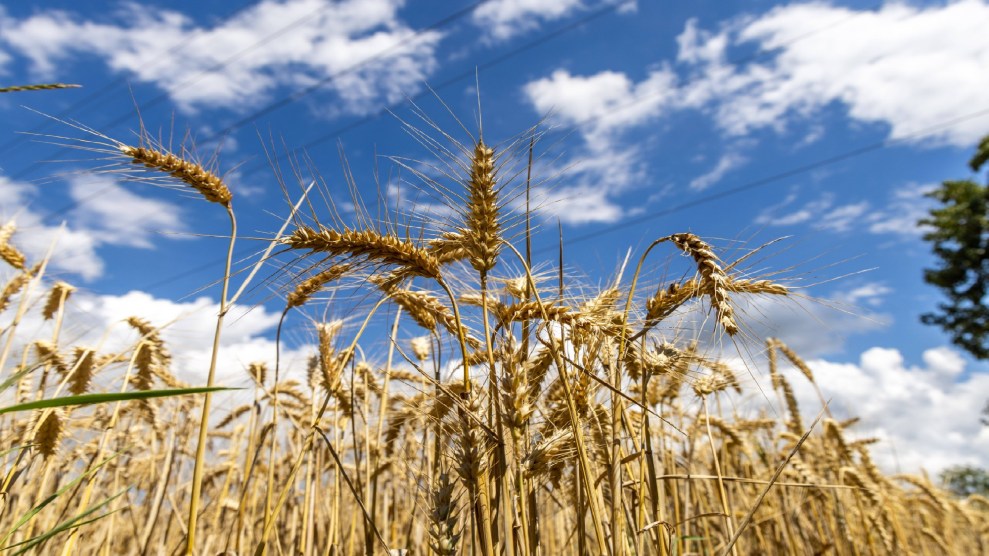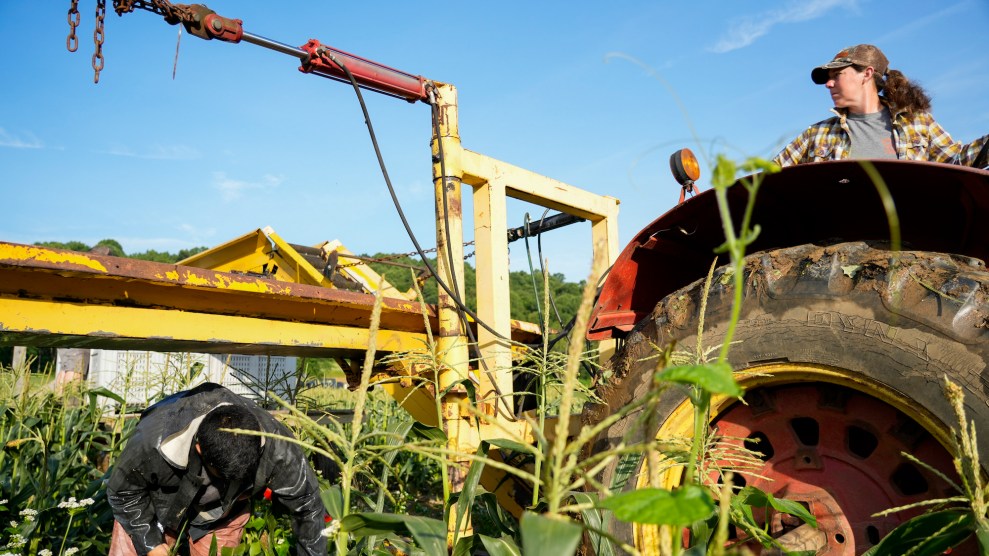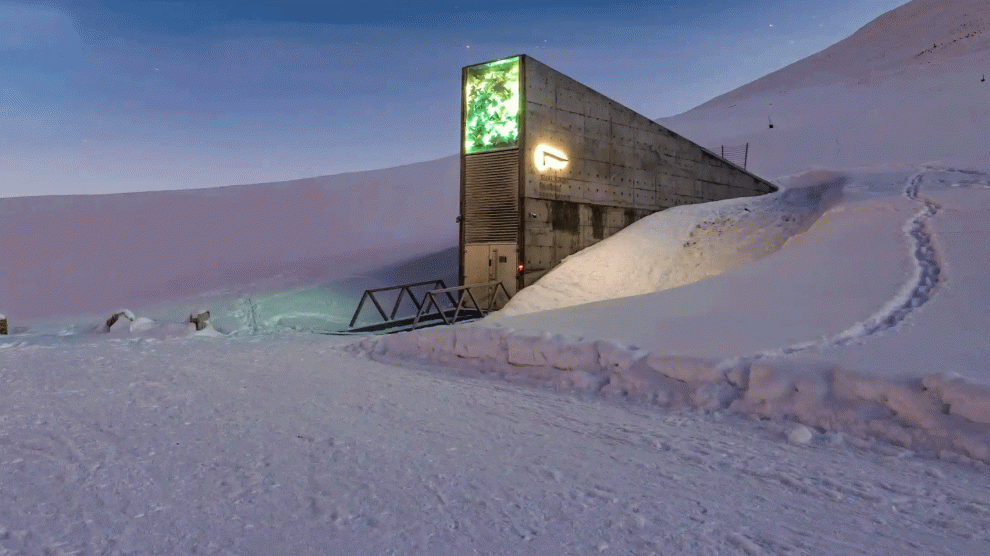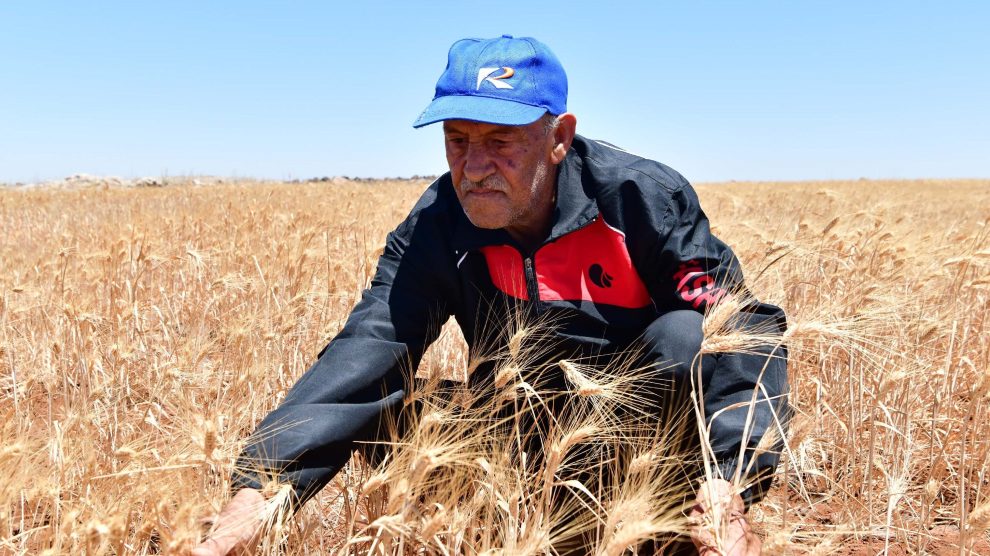
Authur Watkins' collection of wheat varieties may be key to creating more resilient food systems. Imago via ZUMA Press
This story was originally published by the Guardian and is reproduced here as part of the Climate Desk collaboration.
A hundred years ago, the plant scientist Arthur Watkins launched a remarkable project. He began collecting samples of wheat from all over the globe, nagging consuls and business agents across the British empire and beyond to supply him with grain from local markets.
His persistence was exceptional and, a century later, it is about to reap dramatic results. A UK-Chinese collaboration has sequenced the DNA of all the 827 kinds of wheat, assembled by Watkins, that have been nurtured at the John Innes Centre near Norwich for most of the past century.
In doing so, scientists have created a genetic goldmine by pinpointing previously unknown genes that are now being used to create hardy varieties with improved yields that could help feed Earth’s swelling population.
Strains are now being developed that include wheat which is able to grow in salty soil, while researchers at Punjab Agricultural University are working to improve disease resistance from seeds that they received from the John Innes Centre. Other strains include those that would reduce the need for nitrogen fertilisers, the manufacture of which is a major source of carbon emissions.
The collection includes lost varieties that “will be invaluable in creating wheat that can provide healthy yields in the harsh conditions that now threaten agriculture.”
“Essentially we have uncovered a goldmine,” said Simon Griffiths, a geneticist at the John Innes Centre and one of the project’s leaders. “This is going to make an enormous difference to our ability to feed the world as it gets hotter and agriculture comes under increasing climatic strain.”
Today, one in five calories consumed by humans come from wheat, and every year the crop is eaten by more and more people as the world’s population continues to grow.
“Wheat has been a cornerstone of human civilization,” added Griffiths. “In regions such as Europe, north Africa, large parts of Asia, and subsequently North America, its cultivation fed great empires, from ancient Egypt’s to the growth of modern Britain.”
This wheat was derived from wild varieties that were originally domesticated and cultivated in the Fertile Crescent in the Middle East, 10,000 years ago. Many of these varieties and their genes have disappeared over the millennia, a process that was accelerated about a century ago as the science of plant breeding became increasingly sophisticated and varieties with properties that were then considered of no value were discarded.
“That is why the Watkins collection is so important,” said Griffiths. “It contains varieties that had been lost but which will be invaluable in creating wheat that can provide healthy yields in the harsh conditions that now threaten agriculture.”
The project’s other leader, Shifeng Cheng, a professor with the Chinese Academy of Agricultural Sciences, said: “We can retrace the novel, functional and beneficial diversity that were lost in modern wheats after the ‘green revolution’ in the 20th century, and have the opportunity to add them back into breeding programmes.”
Watkins realized that “genes that were then thought to be of little use and which were being deleted from strains might still have future value.”
Scientists had wanted to pinpoint and study the wheat genes in the Watkins collection after the development of large-scale DNA sequencing more than a decade ago, but faced an unusual problem. The genome of wheat is huge: it is made up of 17 billion units of DNA, compared with the 3 billion base pairs that make up the human genome.
“The wheat genome is full of little retro elements and that has made it more difficult and, crucially, more expensive to sequence,” said Griffiths. “However, thanks to our Chinese colleagues who carried out the detailed sequencing work, we have overcome that problem.”
Griffiths and his colleagues sent samples from the Watkins collection to Cheng and were rewarded three months later with the arrival of a suitcase crammed with hard drives. These contained a petabyte—1 million gigabytes—of data that had been decoded by the Chinese group using the Watkins collection.
Astonishingly, this data revealed that modern wheat varieties only make use of 40 percent of the genetic diversity found in the collection.
“We have found that the Watkins collection is packed full of useful variation which is simply absent in modern wheat,” said Griffiths.
These lost traits are now being tested by plant breeders with the aim of creating a host of new varieties that would have been forgotten if it had not been for the efforts of Arthur Watkins.
Arthur Watkins’ introduction to agriculture was unusual. At the age of 19, he was sent to fight in the trenches in the first world war. He survived, and for several months after the armistice he was ordered to remain in France to act as an assistant agricultural officer, tasked with helping local farmers feed the troops who were still waiting to be shipped home.
The post triggered his interest in agriculture and he applied to study it at Cambridge when he returned to Britain, said Simon Griffiths of the John Innes Centre. After graduating, Watkins—a shy, reserved academic—joined the university’s department of agriculture, where he began his life’s work: collecting wheat samples from across the planet.
“Crucially, Watkins had realized that, as we began breeding new wheat varieties, genes that were then thought to be of little use and which were being deleted from strains might still have future value,” said Griffiths.
“His thinking was incredibly ahead of its time. He realised that genetic diversity—in this case, of wheat—was being eroded and that we badly needed to halt that.
“Very few scientists were thinking of this issue in those days. Watkins was clearly thinking well ahead of his time, and we have much to be grateful for that.”
















